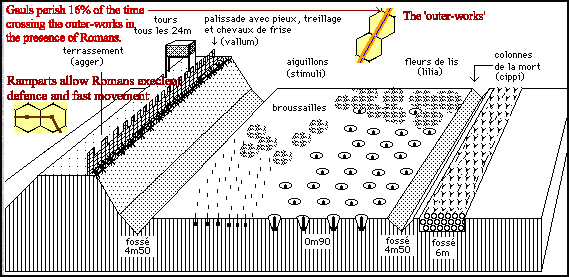


In 58 BC, following his consulship, Gaius Julius Caesar became proconsul of the Roman province of Cisalpine Gaul, the only part of Gaul under Rome's control. In that summer Caesar was drawn into Gallic tribal politics by protecting not only the Roman
possessions but also certain Gallic tribes which begged for salvation from the invading Germans. One campaign led to another, and by 52 BC., all parts of Gaul had been loosely brought under Roman control. In that spring civil disorders reached a peak
in Rome, and while Caesar was in Northern Italy on the circuit court a general uprising took place in Gaul, with Vercingetorix of the Averni as "commander in chief."
Caesar hurried north with new recruits and managed to join Labienus, his able lieutenant, and the scattered legions. Vercingetorix with a sizeable force (featuring formidable cavalry) ravaged the countryside. Caesar caught up with him and fought three
major battles. The Gauls decisively lost two of these and Vercingetorix retreated to the town of Alesia in east-central Gaul. Skirmishes there reaveled that his 100,000 men were no match for Caesar's, although he certainly outnumbered the Romans.
Consequently he withdrew into Alesia and prepared for a siege. Before Caesar could finish investing the town Vercingetorix sent off his 15,000 cavalry to enlist the aid of the rest of Gaul.
Knowing that a relief force was due, Caesar built a defensive perimiter facing outward to match the inner perimiter facing the town. He hoped that these two defensive lines (14 miles long on the outside, 11 miles long on the inside) would both prevent
the Alesia force from breaking out of the siege and keep the relieving force from breaking into Alesia.
The relieving force - over a quarter of a million strong - with the Alesia group gave the Gauls approximately a six to one superiority in head count, but Caesar's men were superbly trained, equipped, and organized, and the thorough defenses were awesome.
The battle would be decisive in determining Gaul's destiny.
Two excerts from 'The Celts', by Gerhard Herm ( ISBN 312-12705-7 )
Livy [ancient Roman historian] wrote of the incedent, "And since the Romans had tried to help [the Clusians] with an embassy and not with arms, they [the Celts] would not reject the offer of peace, provided the Clausians ceded part of their superfluous agricultural land; that was what they, the Celts, wanted.... If it were not given, they would launch an attack before the Romans' eyes, so that the Romans could report back how superior the Celts were in battle to all others.... The Romans then asked wether it was right to demand land from its owners on pain of war, indeed what were the Gauls doing in Eturia in the first place? The latter defiantly retorted that thier right lay in their arms: to the brave belong all things."
